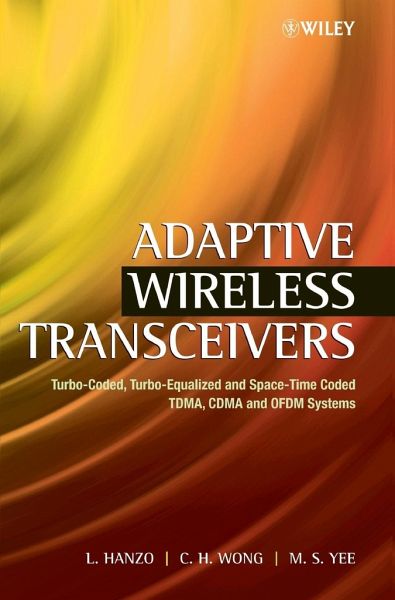
Adaptive Wireless Transceivers
Turbo-Coded, Turbo-Equalized and Space-Time Coded Tdma, Cdma and Ofdm Systems
Versandkostenfrei!
Versandfertig in über 4 Wochen
239,99 €
inkl. MwSt.

PAYBACK Punkte
120 °P sammeln!
Adaptive Wireless Transceivers provides the reader with a broad overview of near-instantaneously adaptive transceivers in the context of TDMA, CDMA and OFDM systems. The adaptive transceivers examined employ powerful turbo codecs, turbo equalisers and space-time codecs, equipping the reader with a future-proof technological road map. It demonstrates that adaptive transceivers are capable of mitigating the channel quality fluctuations of the wireless channel as a lower-complexity alternative to space-time coding. By contrast, if the higher complexity of multiple transmitters and multiple receiv...
Adaptive Wireless Transceivers provides the reader with a broad overview of near-instantaneously adaptive transceivers in the context of TDMA, CDMA and OFDM systems. The adaptive transceivers examined employ powerful turbo codecs, turbo equalisers and space-time codecs, equipping the reader with a future-proof technological road map. It demonstrates that adaptive transceivers are capable of mitigating the channel quality fluctuations of the wireless channel as a lower-complexity alternative to space-time coding. By contrast, if the higher complexity of multiple transmitters and multiple receiver-assisted systems is deemed acceptable, the advantages of adaptability erode. * Provides an in-depth introduction to channel equalisers and Kalman filtering and discusses the associated complexity versus performance trade-offs * Introduces wideband near-instantaneously adaptive transceivers and studies their performance both with and without turbo channel coding * Describes how to optimise adaptive modulation mode switching and highlights a range of practical considerations * Introduces neural network based channel equalisers and discusses Radial Basis Function (RBF) assisted equalisers embedded into adaptive modems supported by turbo channel coding and turbo channel equalisation * Employs the above adaptive principles also in the context of CDMA and OFDM transceivers and discusses the pros and cons of space-time coding versus adaptive modulation Researchers, advanced students and practising development engineers working in wireless communications will all find this valuable text an informative read.




